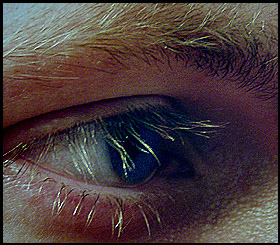Skittish Control Freaks: “In My Parents Basement”
Chris Godsey thinks about artists' intentions and whether they can make them stick.



Artist-audience relationships require mutual respect for freedom of expression: I won’t tell you what or how to create if you don’t tell me how to react. If your art is skillful enough, it will speak for itself. If I have questions about it, I’ll ask them; if I make assumptions or pronouncements, I’ll strive for fairness and credibility.
You must accept the irrelevance of your intentions. I must acknowledge the possible ignorance and bullshit of my interpretation.
In fact, wouldn’t it be utopian-cool if art criticism could take place as conversation—actual human idea exchange—instead of the way it often goes down: artist produces work; reviewer responds in public print or broadcast forum; the cycle ends.
For instance: what if, instead of a poet preemptively explicating a poem, they would just read it, maybe a couple-three times, then take audience questions? And what if, while taking questions, the poet could also ask questions? What if thoughtful discussion ensued, and everyone involved learned something, not only about the poems at hand, but about poetry, and art, and human experience and expression? What if the whole process were more about exploration than explanation?
Couldn’t dense, challenging works become more interesting and accessible—not simplified or softened–that way? And vice versa: couldn’t apparently shallow work be shown as quite complex?
It’s an impossible dream, but one worth refusing to lose, and it’s why I wish the guys in the Minneapolis band Skittish (childhood-friends-turned-adult-musical-collaborators Chris Lahn and Jeff Noller) wouldn’t so strenuously suggest a procedure for responding to almost every aspect of their art.
Attractive, Yet Offputting
Head to www.iamskittish.com. A couple lines below a close-up photo of a human eye, you’re told that the site is “best suited to IE4+ on 800×600+.” Such technical notes are common, and it’s possible that this one really is just about viewing the site—“Hey, if you want the most functional viewing experience, use a relatively new version of Internet Explorer, with your screen resolution set at 800×600 pixels.”
But the advice doesn’t seem necessary, because good Web designers know how to account for a wide variety of browsers and resolution settings. And taken in the context of the entire site, it’s possible for that simple note to come off as pre-emptive experience manipulation: the first in many dismissals of viewer freedom, throughout the site, in favor of artistic prescription.
If you’re running the browser Safari, set at 1024×768, or if you have no idea what “IE4+” and “800×600” mean, you might spend your whole time clicking through the site with a sense that you’re not doing it right. You cannot, the note subtly suggests, accurately grasp Skittish and its art unless you know how to experience it—unless you know how the artists wanted and intended for it to be experienced. You need direction.
You’ll get plenty of it inside the site and in the music it’s meant to promote. That lack of trust—the constant need to show viewers and listeners what they should be thinking and feeling–is pervasive, in a patronizing tone that says, “There’s no way you’ll comprehend this on your own, so we’ll tell you exactly what to do. Don’t mess it up.”
Every page (standard band Web site stuff like, “MP3’s,” “shows,” “words,” “links,” etc.) is anchored by a main section filled with content relevant to the page’s heading. A left-hand sidebar on each page contains brief explanatory comments that seem intended to be sarcastic and clever, but that actually come off as sarcastic and passive-aggressive—the pretentious variety of passive aggression that’s born of simultaneous senses of insecurity and superiority.
Here’s an example, from the “words” page, which features From My Parents Basement lyrics (all capitalization in quotes is shown as it appears on the site): “words that people can relate to. happy words. don’t try to challenge people or say anything new or different; you would risk turning them off and that will affect profits. rhyme ABAB.”
Which begs the response: If your words truly are challenging and unique, melancholy or just plain sad, and more thoughtful than the vapid mainstream, your audience will notice. No need to drop heavy-handed “hints” about what the lyrics are supposed to say or mean or accomplish. Your dissatisfaction and superior artistic integrity have been duly noted. We get it.
The first line of all four songs is a command, and even lyrics that address their own lack of subtlety don’t mitigate the annoying pretentiousness: “So, gather around and I’ll tell you a tale / I hope you catch the irony” begins “Happily Ever After.” It continues, “I’d hate to be so perpetually cynical and stale, but it’s just so fun for me.”
Lowest-common-denominator stuff like that is especially annoying when it’s directly followed by lyrics whose poignancy is self-sufficient: “At 10 Christopher Robin promises that we’ll always be friends / then leaves out the green door, never to return again / 30 years down the road, Christopher Robin closes a business deal / to cut down the Hundred Acre Woods and put condos there instead.”
That second set of lyrics is no less obvious than the first, but it’s also not delivered with a ramrod. On their own, those words and images convey significant anger and sadness. They effectively express grief over losing innocence, regretting misplaced trust, and a bunch of other rotten stuff about literal and figurative growing up. Alone, they’re evocative. Coupled with the didactic—well-meaning, but didactic nonetheless–bullshit, they become annoying and trite.
Even many of the melodies manage to suggest relatively narrow ranges of acceptable responses to the songs. Few lines are just sung. Everything is delivered with an inflective or aural wink one-two, one-two rhythms, affected tones of voice, quirky instruments and arrangements, distorted vocals—it all combines to create impressive emotional distance. Almost every song communicates legitimate sadness, frustration, anger, insecurity—some sort of painful human experience. But very few moments on the CD allow that expression to just be its own significance, and the end result is one of heavy affectation.
According to the Web site’s “bio” page, Skittish “is a duo who refuse to drown in the mainstream. The first full length CD, “…from my parents basement” is a testament to that. This eclectic mix of folk, love, and politics evokes a mix of bright eyes, elliott smith, and radiohead.”
The hearts-on-their-sleeve aspect of Skitttish’s music makes comparisons to those acts easy and obvious, even without reading the bio. But there’s more: imagine a three-way mashup between the emotionally raw Smith, his catchier compatriot Bright Eyes, and the sing-songy, buffoonish, and musically tight Barenaked Ladies, and you get an idea of how split-minded and contrary the disk is—it just wants to be loved, but only on its own terms, and it’s incapable of the trust that love requires, so much so that even its legitimately lovable qualities (like engaging, insightful lyrics and interesting, catchy melodies) can’t prevent it from being attractive yet offputting.
Anxious, depressed people (like me, and like Noller sort of claims to be), and all the other people who try to deal with them for more than 15 minutes, are well-acquainted with the complex cycle of insecure superiority and self-conscious narcissism that defines Skittish’s online and aural presence. Reacting to such art becomes equally paradoxical: empathy for someone who struggles with existence can quickly shift to animosity toward someone who seems bent on selfishness and manipulation. Skittish evokes all that stuff, and when you can stand it, you’ll actually enjoy it.
To hear MP3s, click on the button marked “Related Content” to the right of this article.